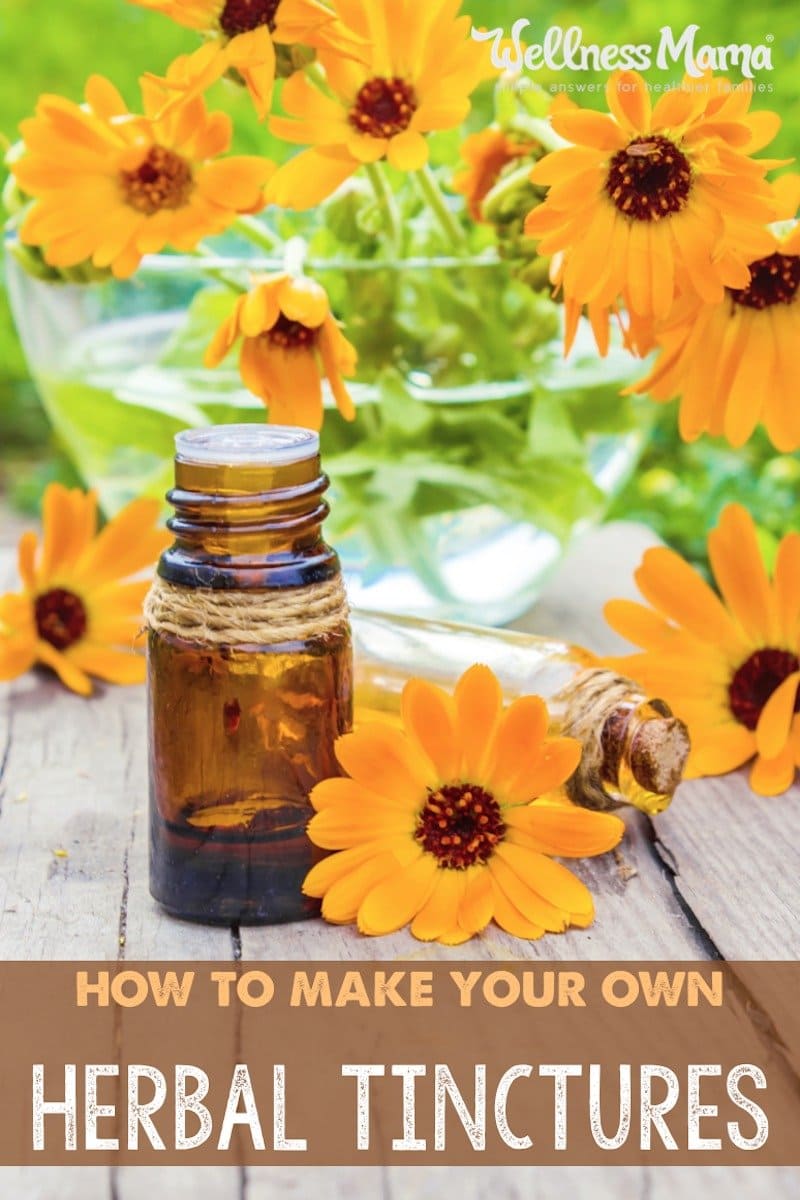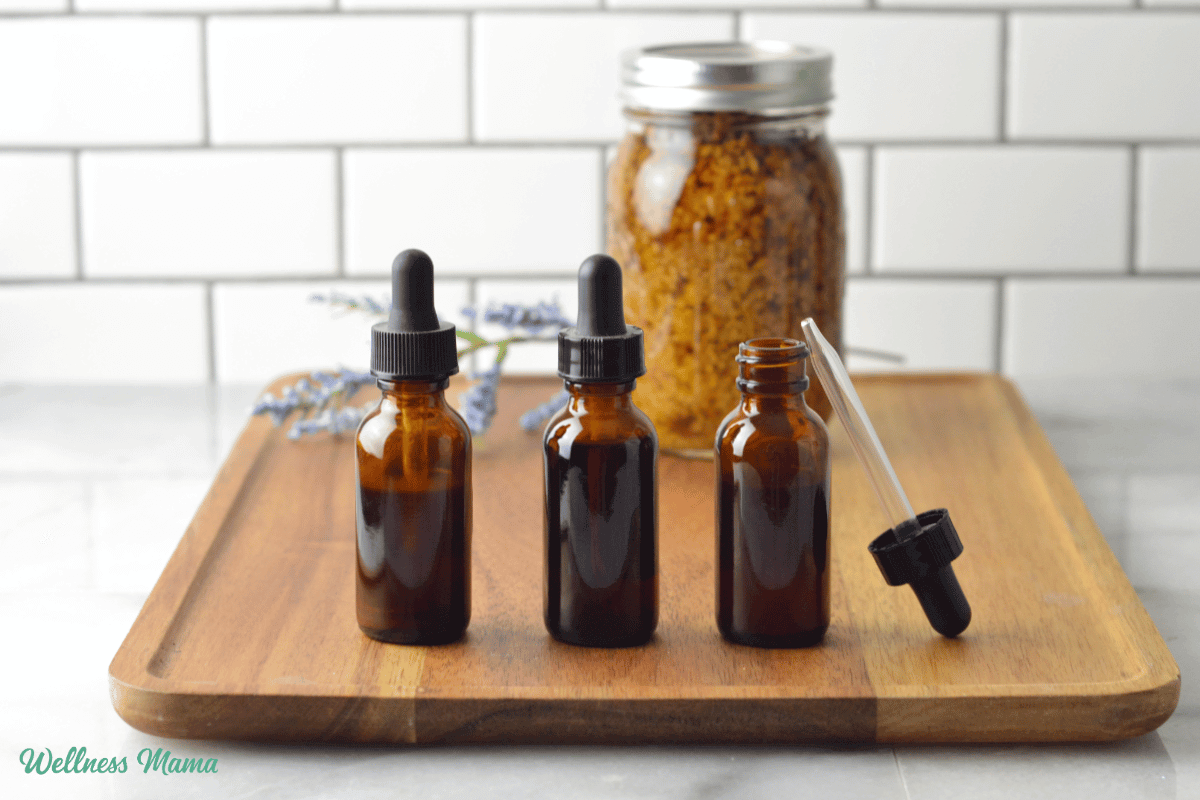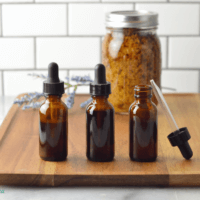One of the first DIY herbal remedies I learned how to make were tinctures. Our family has relied on simple recipes like this chamomile tincture for relaxation (and fussy babies!). However, I realized it might be helpful to give some general instructions on how to make your own tinctures with medicinal herbs.
All you need is some plant material, a mason jar, and alcohol to make your own plant medicine. So what is a tincture exactly? Unlike herbal tea, a tincture uses alcohol to extract plant matter into a liquid concentrate. They’re shelf stable with the health benefits of the herb in a concentrated form.
Alcohol based tinctures last for years when made and stored properly. This is great when the family is sick and you need to grab something quickly without any fuss. I keep several tinctures on hand for my kids. You can even use them externally (including on little ones) for fast relief of common problems.
If you’ve ever bought tinctures from the store or online, I’d encourage you to try making your own. They’re very inexpensive and you can make them in minutes! Tinctures are a great addition to any home apothecary.
Alcohol-Free Tinctures
Some places sell what they call “alcohol-free tinctures.” This can be confusing because a tincture can only be made with an alcohol base. If you want to avoid alcohol, then herbal glycerites made with glycerine are one good option. These herbal extracts aren’t as potent and don’t last as long as a true tincture, but they’re a good alternative. This is what those “alcohol-free tinctures” really are.
Glycerin is naturally very sweet so kids usually like these!
Another option is to make an herbal vinegar. Instead of using alcohol, use vinegar as the solvent instead. Again, it doesn’t extract the exact same chemical constituents from the plants as alcohol, but it will work.
Some sources say to drop a tincture in hot water and let the alcohol evaporate first. However, research shows that only about 15% of the alcohol evaporates this way, plus you lose valuable volatile oils in the process. If you want to avoid alcohol, a better option is to make an herbal glycerite or vinegar.
Tincture Making Supplies
To make a tincture, you will need the following supplies:
- A clean glass jar (at least pint size) with a lid
- Consumable alcohol like vodka or rum- at least 80 proof
- Herbs of choice
How to Make a Tincture
First, pick which herbs you plan to use. These are some of my favorite tincture blends. You can also just tincture a single herb, like peppermint or astragalus.
- Chamomile Tincture (great for kids, promotes restful sleep, and good for skin)
- Digestion Tincture (helps with nausea, heartburn, etc)
- Echinacea Tincture (great immune support when fighting a cold)
- Sweet Dreams Sleep Tincture (to help unwind at night)
- Multivitamin Tincture (extracts water-soluble vitamins)
- Dual Extraction Mushroom Tincture (uses both water and alcohol)
- Ashwagandha Tincture (an adaptogen to help stress response)
- After Birth Tincture (for postpartum mamas)
How to Make a Tincture
Equipment
Materials
- dried herbs
- alcohol (at least 80-proof)
Instructions
- Fill the jar 1/3 to 1/2 full of dried herbs. Filling half full will make a stronger tincture. Do not pack down.
- Fill the rest of the jar with alcohol, leaving about 1 inch of headspace at the top. Stir with a clean spoon.
- Put the lid on the jar. Store the jar in a cool, dark place, shaking daily, for at least two weeks and up to six months. (I usually leave herbs for six weeks).
- Strain the tincture through muslin cheesecloth and compost the herbs. Store the tincture in colored dropper bottles or clean glass jars.
Notes
How to Use Herbal Tinctures
Once you have your tincture, what do you do with it? If you’re using the simple method for tincture making, then the general amount for adults is 1/2 to 1 teaspoon up to three times a day. I usually give the kids 1/4 to 1/3 of the adult dose.
If you’re using more precise tincture making methods, then the dose depends on the herb used and the person taking it. That’s something you’ll need to consult with an herbalist on for your particular situation (or dig through credible resources).
You can also use tinctures topically as a liniment (like for sore muscles). When my kids were little I put a few drops of digestion tincture on their tummies to help with gas and colic. They absorb into the skin and can provide many of the same health benefits. Too much can be drying though since it’s alcohol!
Who Can Use a Tincture?
Unlike OTC meds, herbal medicine isn’t designed to be one size fits all. In general, tinctures can be safe for all ages and even during pregnancy and breastfeeding. That said, it depends on the herb being used, how much someone uses, and what they’re using it for.
Gentle herbs like elderberry, ginger, and lemon balm have a much wider safety net than herbs like anemone, which can be toxic in high doses. Largely safe bitters like dandelion help stimulate digestion, while elderberry supports the immune system. Be sure to research an herb you want to use beforehand to make sure it’s safe for you (or your kids).
I’ve included some recipes below with common herbs that are great options for most people to get you started. I don’t (and can’t) give medical advice, so be sure to consult a natural healthcare provider before starting a new supplement.
Where to Get the Ingredients
Your backyard! Really though, you can use plants from your own garden or even backyard “weeds” to make tinctures. I’ve also bought herbs from reputable sources online, like Mountain Rose Herbs or Starwest Botanicals. If you’re foraging for plants make sure you correctly identify them before using. Here’s how to dry your herbs.
Alcohol is easy enough to come by at any grocery or liquor store. Organic alcohol can be harder to find but there are some good online sources. You can get organic alcohol here.
Then all you need is a glass jar (like a Mason jar) and a glass bottle to store your finished tincture in.
What Kind of Alcohol is Best For Tinctures?
Grain alcohol is the common option, but you can also find grain-free options like potato vodka. For most tinctures, I use 80-proof alcohol, like the clear vodka. High-proof alcohol (like 190-proof Everclear) is also very useful.
Fresh herbs have a higher water content and can spoil faster in a lower 80-proof alcohol. Since 190-proof alcohol is 95% alcohol by volume, you can also mix it with distilled water in different ratios to get a specific alcohol percentage. Some herbs or parts of the plants are best extracted with different alcohol percentages. Straight 190-proof alcohol works great to extract volatile oils and resins.
For the sake of simplicity though I’ve given instructions on how to use the simple or folk method!
Have you ever made your own herbal tinctures? What are your favorites? Share below!






Leave a Reply